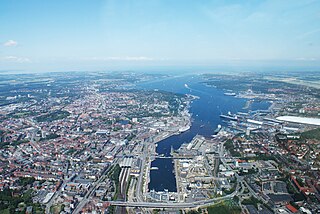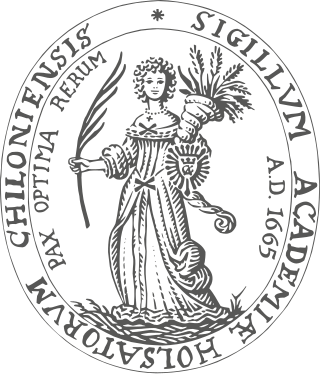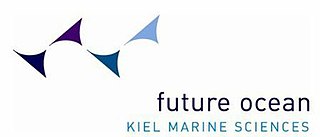Related Research Articles

Kiel is the capital and most populous city in the northern German state of Schleswig-Holstein, with a population of 246,243 (2021).

FishBase is a global species database of fish species. It is the largest and most extensively accessed online database on adult finfish on the web. Over time it has "evolved into a dynamic and versatile ecological tool" that is widely cited in scholarly publications.

Kiel University, officially the Christian-Albrecht University of Kiel, is a public research university in the city of Kiel, Germany. It was founded in 1665 as the Academia Holsatorum Chiloniensis by Christian Albert, Duke of Holstein-Gottorp and has approximately 27,000 students today. It is the largest, oldest, and most prestigious university in the state of Schleswig-Holstein.
The Helmholtz Association of German Research Centres is the largest scientific organisation in Germany. It is a union of 18 scientific-technical and biological-medical research centers. The official mission of the Association is "solving the grand challenges of science, society and industry". Scientists at Helmholtz therefore focus research on complex systems which affect human life and the environment. The namesake of the association is the German physiologist and physicist Hermann von Helmholtz.
The Surface Ocean Lower Atmosphere Study (SOLAS) is a global and multidisciplinary research project dedicated to understanding the key biogeochemical-physical interactions and feedbacks between the ocean and the atmosphere. Further, SOLAS seeks to link ocean-atmosphere interactions with climate and people. Achievements of these goals are essential in order to understand and quantify the role that ocean-atmosphere interactions play in the regulation of climate and global change.

An autonomous underwater vehicle (AUV) is a robot that travels underwater without requiring continuous input from an operator. AUVs constitute part of a larger group of undersea systems known as unmanned underwater vehicles, a classification that includes non-autonomous remotely operated underwater vehicles (ROVs) – controlled and powered from the surface by an operator/pilot via an umbilical or using remote control. In military applications an AUV is more often referred to as an unmanned undersea vehicle (UUV). Underwater gliders are a subclass of AUVs.

Rainer Froese is a senior scientist at the Helmholtz Center for Ocean Research (GEOMAR) in Kiel, formerly the Leibniz Institute of Marine Sciences (IFM-GEOMAR), and a Pew Fellow in Marine Conservation. He obtained an MSc in Biology in 1985 at the University of Kiel and a PhD in Biology in 1990 from the University of Hamburg. Early in his career, he worked at the Institute of Marine Sciences on computer-aided identification systems and the life strategies of fish larvae. His current research interests include fish information systems, marine biodiversity, marine biogeography, and the population dynamics of fisheries and large marine ecosystems.

The GEOMAR - Helmholtz Centre for Ocean Research Kiel (GEOMAR), formerly known as the Leibniz Institute of Marine Sciences, is a research institute in Kiel, Germany. It was formed in 2004 by merging the Institute for Marine Science with the Research Center for Marine Geosciences (GEOMAR) and is co-funded by both federal and provincial governments. It was a member of the Leibniz Association until 2012 and is coordinator of the FishBase Consortium. Since 2012 it is member of the Helmholtz Association and named GEOMAR - Helmholtz Centre for Ocean Research Kiel. The institute operates worldwide in all ocean basins, specialising in climate dynamics, marine ecology and biogeochemistry, and ocean floor dynamics and circulation. GEOMAR offers degree courses in affiliation with the University of Kiel, and operates the Kiel Aquarium and the Lithothek, a repository for split sediment core samples.
The Deutsches Klima-Konsortium e. V. is located in Berlin, Germany, and represents the leading players of German climate and climate impact research encompassing 26 renowned research organisations. The federation is also an important international partner acting as a guidepost, strategic partner, project partner and information broker.

The Future Ocean is a Cluster of Excellence founded in November 2006 in line with the German excellence initiative by the Christian-Albrechts-Universität zu Kiel (CAU), the Muthesius Kunsthochschule (MKHS), the Institut für Weltwirtschaft (IfW) and the Helmholtz-Zentrum für Ozeanforschung (GEOMAR). It is an interdisciplinary marine research group and it is funded by the German Research Foundation (DFG). Part of the cluster is the Integrated School of Ocean Sciences (ISOS) which is a post graduate school for ocean sciences in Kiel.
Museen am Meer is an association of eight museums in the city centre of Kiel, Schleswig-Holstein, Germany, on the edge of Kiel Fjord. The consortium was founded in 2010.

JAGO is the only crewed German research submersible. The submersible and the crew K. Hissmann and the pilot J. Schauer are based at the GEOMAR Helmholtz Centre for Ocean Research Kiel since 1 January 2006. The former owner was zoologist Hans Fricke from the Max Planck Institute for Behavioral Physiology in Seewiesen, Bavaria. JAGO can dive up to 400 metres (1,300 ft) and can carry one pilot and one observer. It can sample organisms, rock, gas and liquids, and can be used as a rescue and recovery vehicle for the northern Baltic Sea area. Due to the multidisciplinary connection between the GEOMAR and the Christian-Albrechts-Universität zu Kiel, scientists from the Cluster of Excellence "The Future Ocean" have occasional access to the submersible.
The ROV KIEL 6000 is a remotely operated vehicle built by Schilling Robotics, Davis, California. It's in the possession of the German GEOMAR - Helmholtz Centre for Ocean Research Kiel. The ROV has been designed for certain scientific tasks with a max. operational depth of 6,000 m. The ROV is electrically powered and directly linked to the operating ship via a deep-sea glass fiber cable. It can be operated from ships of opportunity which fulfill certain requirements such as deck space and stability, power supply, dynamic positioning and crane/winch capacities.
ROV PHOCA is a remotely operated underwater vehicle of the COMANCHE type. It was built by sub-Atlantic, Aberdeen, Scotland and is owned by the GEOMAR - Helmholtz Centre for Ocean Research Kiel. Its smaller size compared to the ROV KIEL 6000 and therefore its deploy ability from medium-sized research vessels makes it a complement to the QUEST type ROV. It can dive up to 3000m and was designed as a Work-Class- and Intervention-ROV.

The Kiel University of Applied Sciences is a University of Applied Sciences, established in 1969. It is one of three public institutions of higher learning in Kiel, Germany. It provides around 30 Bachelor‘s and Master‘s degrees, supplementary degrees and continuing education courses by the faculties of Agriculture, Business Management, Computer Science & Electrical Engineering, Mechanical Engineering, Media and Social Work and Health. As of November 2018 there are 7824 students enrolled.
Gerold Siedler is a German physical oceanographer. He is professor emeritus at the Christian-Albrechts University of Kiel and at the GEOMAR Helmholtz Centre for Ocean Research Kiel.
The Institut für Meereskunde in Kiel, Germany, existed from April 1, 1937 to January 1, 2004. It was an essential element of the long history of marine sciences in Kiel. This history started with the work of Samuel Reyher published in 1697 and is today continued within the GEOMAR Helmholtz Centre for Ocean Research Kiel.
Sergey Konstantinovich Gulev is a Russian climate scientist. He is head of the ocean-atmosphere interaction laboratory at the Shirshov Institute of Oceanology, Russian Academy of Sciences and is a professor of oceanology and meteorology at Moscow State University. In 2011, he was elected as a Corresponding Member of the Russian Academy of Sciences.
The International Max Planck Research School for Evolutionary Biology is an international PhD program in Germany dedicated to research and training in Evolutionary Biology. It is one of the top locations in the area of evolutionary and biological research in Germany. It developed as the result of a joint program between the Max Planck Institute for Evolutionary Biology in Plön, the Christian Albrechts University and the Helmholtz Center for Ocean Research (GEOMAR) in Kiel.

The Humanity 1 is a German Search and Rescue Ship. The former German research ship is owned by SOS Humanity, having previously been owned by Sea-Watch e. V., who use the ship for SAR operations of refugees in distress on the Mediterranean Sea. Previously, the GEOMAR Helmholtz Centre for Ocean Research Kiel (GEOMAR) operated the ship under the name of Poseidon, after the Greek god of the sea, with the State of Schleswig-Holstein as the owner. In January 2020 the ship was auctioned and bought by Sea-Watch e. V. and renamed Sea-Watch 4 on 20 February 2020; the ship was further re-named, to Humanity 1, in August 2022.
References
- ↑ AUV Abyss, GEOMAR - Helmholtz Centre for Ocean Research Kiel, 2012
- ↑ Technical Specifications (German) Archived 2014-04-21 at the Wayback Machine , GEOMAR - Helmholtz Centre for Ocean Research Kiel, 2012